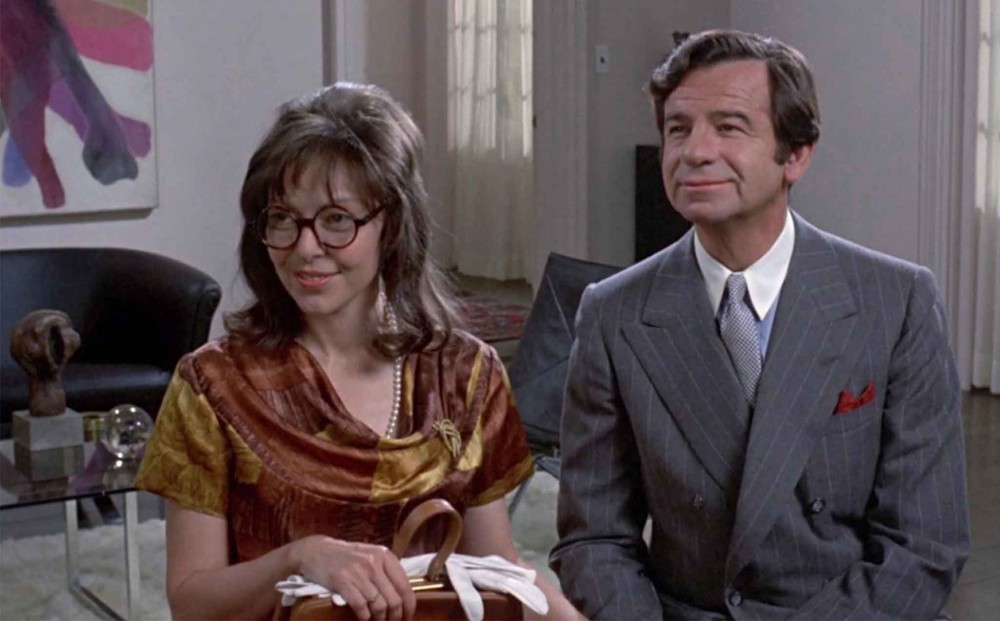Sacrifice in A New Leaf and In Bruges
Re-watching The Apostle last weekend brought to mind two other really good dark comedies, A New Leaf and In Bruges. Sacrifice prompted by love connects these otherwise very different films.
I first viewed A New Leaf as a child on late-night television, and immediately fell in love with it. I don’t know how many times I’ve re-watched it over the years. It’s a family favorite; we quote lines from the movie to each other when we face like circumstances.
Elaine May wrote the screenplay (based on Jack Ritchie’s The Green Heart). She also directed and starred in the film.
The story concerns Henry Graham (played Walter Matthau), an aging spendthrift who for years overspent his inheritance and finally ran through his entire fortune. (During my years as department head, I half-jokingly accused the long-time assistant department head, when speaking of the department’s budget, of talking to me the way Beckett, Henry’s accountant, talks to him when explaining he has “no capital.”) Henry, at the nudging of his man-servant (played to a T by George Rose) moves to marry a rich woman to solve his penury. He only has a few weeks to do so, however, until his poverty becomes public knowledge.
As his time is about to run out, he meets Henrietta Lowell (May) at a snobby tea party. She is fabulously wealthy, single and without relatives, and wholly devoted to her vocation as a college instructor in botany. She is also clueless and socially inept, although also sweet and naive. Henry sweeps her off her feet as quickly as he sweeps the crumbs off her dress after every meal (and nips the price tags off her clothes before she heads off to class). Henrietta is devoted to Henry. Henrietta repulses Henry, except for her fortune. “She’s feral. She does not deserve to live,” Henry lets slip to his butler. Even before their wedding, Henry starts planning her murder after their marriage.
Henrietta’s life-long dream is to discover a new species of plant and thereby to earn a place for her name in the botany books, a little bit of “immortality,” as she puts it. On their honeymoon, Henrietta finds a fern she cannot identify. She returns with it and sends it for classification as she starts her married life with Henry. Henry devotes himself to time looking for a way to murder her without leaving evidence of his responsibility even as he grows up, overseeing Henrietta’s estate, and Henrietta herself.
One afternoon, Henrietta comes running to the mansion excitedly yelling for Henry. After he meets her in the garden, Henrietta explains she’s been notified she did indeed discover a new species of fern on their honeymoon, naming it “esophiligha grahami.” Observing she has “achieved a kind of immortality,” Henry soon notes the name, then chastises her for naming the fern “grahami,” after her married name, when she did all of her previous research under her maiden name, Lowell.
Henrietta replies, “I didn’t name it after me, Henry, I named it after you.”
Henry is taken aback. After weakly asking her whether it wouldn’t be better to name it after herself, he observes, as a result of Henrietta’s action, “Well, I’ve achieved a small slice of immortality myself.”
Henrietta’s life goal was to discover a new species of plant. In her love for Henry, Henrietta sacrifices her most heartfelt desire, her own “immortality,” giving it to Henry instead.
Henrietta’s sacrifice begins to work on, and in, Henry. The film ends with Henry transformed by Henrietta’s sacrificial love, born anew (almost literally, as he emerges out of water a new man), and now requites Henrietta’s love, even if he does so grudgingly, not entirely understanding what accounts for his transformation.
The film as it was released was apparently not the film Elaine May intended to make. Controversy followed. Her version would have painted Matthau in much darker tones. I am unsure it would have changed the fundamentally redemptive narrative of the film as released. The film as released, however, is a product of breath-taking charm.
In Bruges, on the other hand, is as brutal and dark as A New Leaf is winsome and charming. But sacrificial love, albeit a platonic one, rests at the center of the film as well.
Two contract killers, Ray (Colin Farrell) and Ken (Brendan Gleeson) are on the lam in Bruges, Belgium, waiting for a new assignment. Ray is haunted by the accidental death of a child incidental to his last hit (on a priest). While in Bruges, their boss, played by Ralph Fiennes, orders Ken to kill Ray, since it is unforgiveable to kill a child. The implication, however, is that Fiennes is also increasingly concerned about Ray becoming a threat to him, as Ray seems increasingly unhinged by the accidental killing.
However, Ken repeatedly delays killing Ray. Instead they tour Bruges, looking at religious art, among other things. The art arrests Ray; Ken explains how it portrays the possibility of redemption.
Exasperated at Ken’s failure to kill Ray, Fiennes finally travels to Bruges to kill Ray himself.
In a scene as shocking as it is moving, in order to save Ray from Fiennes, Ken pitches himself off a church’s bell tower onto the stone street far below. Ken’s friendship with, and love for, Ray, underplayed throughout the film, slowly crescendos to this scene. It is, to say the least, a jarring picture of sacrifice and redemption given the repulsive vocation Ray and Ken pursue. All the more shocking that within this very dark world we see witness to the moving statement in the Gospel of John, “Greater love has no one than this, that a man lay down his life for his friends.”
Both films have great stories and great supporting casts. While sacrifice stands at the center of each film, each also carries the theme effortlessly, almost unexpectedly. And in so doing each punches with unexpected power.
